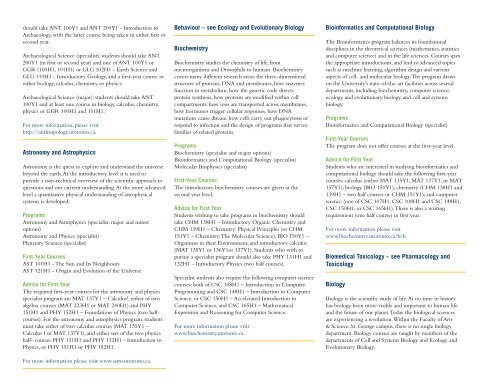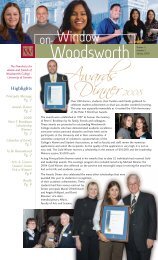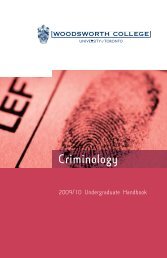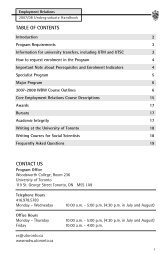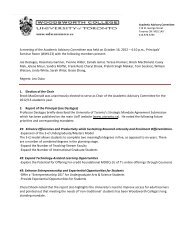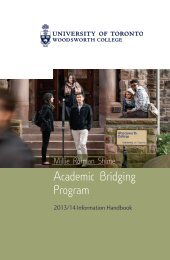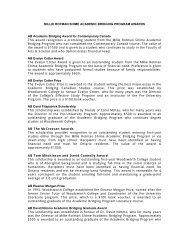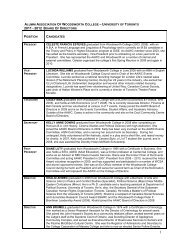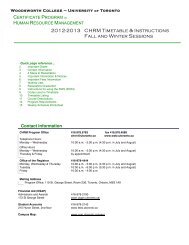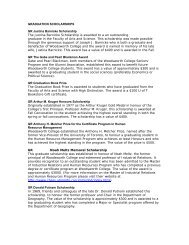First-Year Handbook 2009/10 - Woodsworth College - University of ...
First-Year Handbook 2009/10 - Woodsworth College - University of ...
First-Year Handbook 2009/10 - Woodsworth College - University of ...
Create successful ePaper yourself
Turn your PDF publications into a flip-book with our unique Google optimized e-Paper software.
should take ANT <strong>10</strong>0Y1 and ANT 200Y1 - Introduction toArchaeology, with the latter course being taken in either first orsecond year.Archaeological Science (specialist): students should take ANT200Y1 (in first or second year) and one <strong>of</strong> ANT <strong>10</strong>0Y1 orGGR (<strong>10</strong>0H1, <strong>10</strong>1H1) or GLG <strong>10</strong>2H1 - Earth Science andGLG 1<strong>10</strong>H1 - Introductory Geology, and a first-year course ineither biology, calculus, chemistry or physics.Archaeological Science (major): students should take ANT<strong>10</strong>0Y1 and at least one course in biology, calculus, chemistry,physics or GGR <strong>10</strong>0H1 and <strong>10</strong>1H1.For more information, please visithttp://anthropology.utoronto.ca.Astronomy and AstrophysicsAstronomy is the quest to explore and understand the universebeyond the earth. At the introductory level it is used toprovide a non-technical overview <strong>of</strong> the scientific approach toquestions and our current understanding. At the more advancedlevel a quantitative physical understanding <strong>of</strong> astrophysicalsystems is developed.ProgramsAstronomy and Astrophysics (specialist, major and minoroptions)Astronomy and Physics (specialist)Planetary Science (specialist)<strong>First</strong>-<strong>Year</strong> CoursesAST <strong>10</strong>1H1 - The Sun and Its NeighboursAST 121H1 - Origin and Evolution <strong>of</strong> the UniverseAdvice for <strong>First</strong> <strong>Year</strong>The required first-year courses for the astronomy and physicsspecialist program are MAT 137Y1 – Calculus!, either <strong>of</strong> twoalgebra courses (MAT 223H1 or MAT 240H1) and PHY151H1 and PHY 152H1 – Foundations <strong>of</strong> Physics (two halfcourses).For the astronomy and astrophysics program, studentsmust take either <strong>of</strong> two calculus courses (MAT 135Y1 –Calculus I or MAT 137Y1), and either sets <strong>of</strong> the two physicshalf- courses PHY 131H1 and PHY 132H1 - Introduction toPhysics, or PHY 151H1 or PHY 152H1.For more information please visit www.astro.utoronto.ca.Behaviour – see Ecology and Evolutionary BiologyBiochemistryBiochemistry studies the chemistry <strong>of</strong> life, frommicroorganisms and Drosophila to humans. Biochemistrycovers many different research areas: the three-dimensionalstructure <strong>of</strong> proteins, DNA and membranes, how enzymesfunction in metabolism, how the genetic code directsprotein synthesis, how proteins are modified within cellcompartments, how ions are transported across membranes,how hormones trigger cellular responses, how DNAmutations cause disease, how cells carry out phagocytosis orrespond to infection and the design <strong>of</strong> programs that surveyfamilies <strong>of</strong> related proteins.ProgramsBiochemistry (specialist and major options)Bioinformatics and Computational Biology (specialist)Molecular Biophysics (specialist)<strong>First</strong>-<strong>Year</strong> CoursesThe introductory biochemistry courses are given at thesecond year level.Advice for <strong>First</strong> <strong>Year</strong>Students wishing to take programs in biochemistry shouldtake CHM 138H1 – Introductory Organic Chemistry andCHM 139H1 – Chemistry: Physical Principles (or CHM151Y1 – Chemistry: The Molecular Science), BIO 150Y1 –Organisms in their Environment, and introductory calculus(MAT 135Y1 or 136Y1or 137Y1). Students who wish topursue a specialist program should also take PHY 131H1 and132H1 – Introductory Physics (two half courses).Specialist students also require the following computer sciencecourses: both <strong>of</strong> CSC <strong>10</strong>8H1 – Introduction to ComputerProgramming and CSC 148H1 – Introduction to ComputerScience, or CSC 150H1 – Accelerated Introduction toComputer Science, and CSC 165H1 – MathematicalExpression and Reasoning for Computer Science.For more information please visitwww.biochemistry.utoronto.ca.Bioinformatics and Computational BiologyThe Bioinformatics program balances its foundationaldisciplines in the theoretical sciences (mathematics, statisticsand computer science) and in the life sciences. Courses spanthe appropriate introductions, and lead to advanced topicssuch as machine learning, algorithm design and variousaspects <strong>of</strong> cell- and molecular biology. The program drawson the <strong>University</strong>’s state-<strong>of</strong>-the-art facilities across severaldepartments, including biochemistry, computer science,ecology and evolutionary biology, and cell and systemsbiology.ProgramsBioinformatics and Computational Biology (specialist)<strong>First</strong>-<strong>Year</strong> CoursesThe program does not <strong>of</strong>fer courses at the first-year level.Advice for <strong>First</strong> <strong>Year</strong>Students who are interested in studying bioinformatics andcomputational biology should take the following first-yearcourses: calculus (either MAT 135Y1, MAT 137Y1, or MAT157Y1); biology (BIO 150Y1); chemistry (CHM 138H1 and139H1 – two half courses or CHM 151Y1); and computerscience (one <strong>of</strong> CSC <strong>10</strong>7H1, CSC <strong>10</strong>8H1 and CSC 148H1,CSC 150H1, or CSC 165H1). There is also a writingrequirement (one half course) in first year.For more information please visitwww.biochemistry.utoronto.ca/bcb.Biomedical Toxicology – see Pharmacology andToxicologyBiologyBiology is the scientific study <strong>of</strong> life. At no time in historyhas biology been more visible and important to human lifeand the future <strong>of</strong> our planet. Today the biological sciencesare experiencing a revolution. Within the Faculty <strong>of</strong> Arts& Science, St. George campus, there is no single biologydepartment. Biology courses are taught by members <strong>of</strong> thedepartments <strong>of</strong> Cell and Systems Biology and Ecology andEvolutionary Biology.


